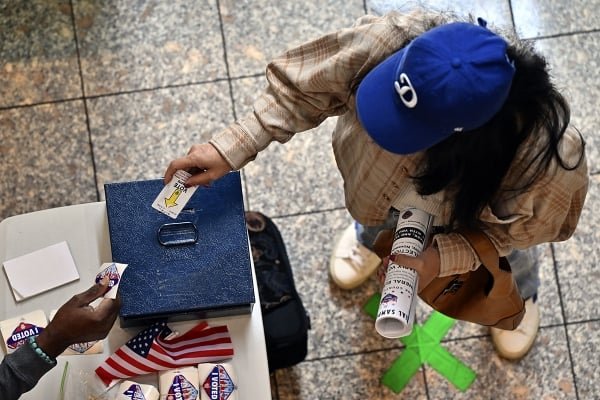State ballot measures produce good news for higher ed
A Las Vegas woman returns her voting card after casting a ballot Tuesday.
David Becker/Getty Images
Many concerns loom as a second Donald Trump presidential term promises to usher in sweeping changes and shine a glaring spotlight on higher ed, but higher education institutions won several victories in state and local ballot measures on Tuesday. Perhaps most notably, Nevada voters decided to maintain an elected Board of Regents after a nearly decade-long fight over who should oversee the state’s higher education institutions.
The referendum—known as Question 1—would have erased all reference to the current 13-member panel from the state Constitution, opening the door for a legislative overhaul of how Nevada governs its eight colleges and universities.
Bipartisan lawmakers who supported the change believed it would be key to ensuring tighter institutional accountability in a system that has churned through chancellors and seen a slew of high-profile controversies in recent years—so much so that this was the second time the lawmakers put the measure before voters in recent years.
But opponents argued that directly electing board members shields the state’s higher education system from the heavy politicization of legislative appointment and protects academic freedom. And both times voters rejected the amendment, this time by a more significant 11-percentage-point margin.
Nevada will remain one of 28 states with a single administrative board overseeing all of public higher ed—and the only one that elects its members.
Current regents who led the campaign to oppose Question 1 feared that allowing the Legislature or governor to appoint all board members could lead to scenarios like what happened under Governor Ron DeSantis in Florida, where entire university departments were eliminated as a result of culture wars.
“The very reason why the Board of Regents are in the Constitution in the first place is because education doesn’t need to swing with the political pendulum,” board member Laura Perkins said in October, adding that she wasn’t speaking as a representative of the panel. “Education needs to have shared governance, not complete autonomy, but enough so that we don’t politicize education.”
The majority of Nevada voters clearly agreed.
More Money for Colleges
Inside Higher Ed has also been tracking three key state bond issues and one constitutional amendment, all of which are all on track to pass and will provide more resources to higher education institutions in California, New Mexico, Rhode Island and Utah.
New Mexico’s $230 million bond will go toward capital improvements across higher education institutions, but it help the state’s land-grant and flagship institutions most.
Biomedical science and cybersecurity programs in Rhode Island will benefit from a $160.5 million measure. Supporters said the programs to which funds will be allocated will produce nearly 8,500 openings in good-paying jobs and will lead to economic prosperity and better health outcomes.
And even though only 53 percent of the votes had been counted in California by Wednesday evening, so far the majority of voters (57 percent) in the historically blue state have backed a referendum that would authorize $10 billion in bonds to build or repair K-12 schools and community colleges.
In Utah, voters did not have to decide if borrowing was the best solution to gain extra funds for higher ed. Rather, they elected to increase the limit on annual distributions from an endowment known as the State School Fund from 4 percent to 5 percent—boosting appropriations for Utah public schools, colleges and universities at no cost in taxes. The measure received overwhelming support at 70 percent.
Community colleges in Arizona also scored a win as voters increased a spending cap on higher education in Maricopa County. The community college district, one of the largest in the nation, was facing an uncommon bind—it had more money than it could legally spend. But the passage of Proposition 486 will implement a new permanent spending equation that will allow the district to spend double its previous $451 million limit.

You may be interested

Dec 26: CBS News 24/7, 1pm ET
new admin - Dec 26, 2024Dec 26: CBS News 24/7, 1pm ET - CBS News Watch CBS News 38 killed in Kazakhstan plane crash; Beyoncé…

Colorado’s Deion Sanders warns players about smoking ahead of bowl game
new admin - Dec 26, 2024[ad_1] Colorado Buffaloes head football coach Deion Sanders laid down the rules for his team as they arrived at their…

ChatGPT is down – The Verge
new admin - Dec 26, 2024ChatGPT isn’t working for many users right now. With numerous reports on social media, we also confirmed that the chatbot…




































